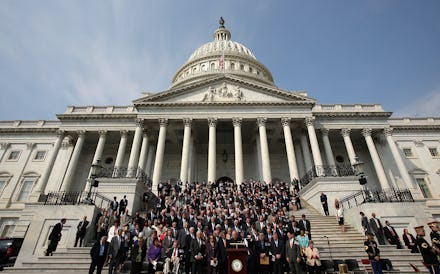Republican Party Is Likely to Be Even More Male and More White After 2016 Election

The American political party that is poised to knight a real estate mogul turned reality TV star as its presidential nominee is also on verge of taking a diversity blow. As the Republican Party rolls out its convention red carpet for Donald Trump, elected GOP officials who fit the demographics that he has routinely lampooned — women and minorities — are in danger of losing reelection, The Hill reported Tuesday.
This comes as the GOP scrambles to find candidates who might energize young, millennial voters. Their efforts seem to have fallen flat this year — the National Republican Congressional Committee last week released a list of 11 top-tier candidates for its millennial-focused "Young Guns" program and they were mostly white and male.
Meanwhile, Democrats will likely retain or see gains in House representation of women, Hispanics, African-Americans and Asian-Americans, according to The Hill. Most of the women and minority members of Congress are Democrats.
Women make up just 84 of 435 House members — of which 22 are Republicans. All 10 of the Asian-American House members are Democrats. Two of the 43 black House members are Republicans, while six of the 29 Latino House members are GOP.
On the Senate side, 20 of 100 current members are women, while just six are people of color. That breaks down to one Asian-American, three Latinos and two blacks. Sens. Tim Scott (R-SC), Marco Rubio (R-Fla.) and Ted Cruz (R-Texas) are the GOP members of color.
It's no secret that the Republican Party has historically struggled to attract minorities. The party has been more recently linked to policies such as voter ID laws and transgender bathroom bills that have a disproportionate negative impact on racial minorities and the LGBTQ community. But diversity problems have also shown up at the local levels.
The nation as a whole is roughly 33% nonwhite, according to the Pew Research Center. But only 14% of state legislators are racial minorities, according to a New American Leaders Project report released in January.
The Republican National Committee called for the party to embrace diverse candidates following the re-election of President Barack Obama in 2012. "Young voters are increasingly rolling their eyes at what the Party represents, and many minorities wrongly think that Republicans do not like them or want them in the country," an RNC report states.
Authors of the report added: "When someone rolls their eyes at us, they are not likely to open their ears to us."
So, who might young Republicans and independents of color listen to? Reps. Mia Love (R-UT) and Will Hurd (R-Texas), who are black, and Carlos Curbelo (R-Fla.), who is Hispanic — each are fighting uphill battles for reelection, according to The Hill.
If Love and Hurd lose in November, and no other candidates of color are elected, the GOP will have no African-Americans in what is supposed to be the nation's more representative body.
Read more: